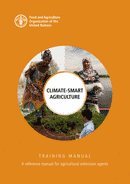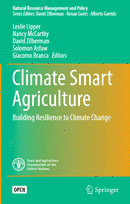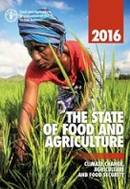以下为有关气候智能型农业的信息资源,旨在帮助利益相关者和研究人员在全球、区域和地方级别实施有关气候智能型农业实践的相关工作。
Publications
This manual is intended for agricultural extension agents and others interested in developing training courses on climate-smart agriculture. The manual intends to answer the following questions:
What is climate change and what are its causes? How will climate change affect agriculture? What can be done to support agricultural producers, both male and female, to adjust to new conditions? What are practical solutions that agricultural producers and others can put into practice? What types of changes will other stakeholders need to make in order to introduce climate-smart agriculture? How does a trainer structure a participatory capacity-development process? How can climate change can be effectively communicated to food producers?
Climate Smart Agriculture (CSA) is an approach to guide the management of agriculture in the era of climate change. The concept was first launched in 2009, and since then has been reshaped through inputs and interactions of multiple stakeholders involved in developing and implementing the concept. CSA aims to provide globally applicable principles on managing agriculture for food security under climate change that could provide a basis for policy support and recommendations by multilateral organizations, such as UN’s FAO. The major features of the CSA approach were developed in response to debates and controversies in climate change and agricultural policy for sustainable development. The purpose of this paper is to give an overview of the evolution of CSA, introduce its major components, and summarize the key debates associated with it within the context of climate change and agricultural policy debates The first section provides an overview of international climate change policy followed by an introduction and analysis of CSA and its history. This is then followed by a discussion of three broad controversies related to CSA, namely the role of mitigation, the relationship of CSA to sustainable agriculture, and way biotechnology is treated in the CSA approach.
Since the effects of climate change are already being felt, incorporating adaptation into agricultural policies, plans and investments is needed to maintain and enhance the benefits obtained from agriculture. Risk management strategies have a prominent role to play in adaptation, ranging from increasing resilience of agro-ecosystems through better management of ecosystem services, increasing resilience of livelihoods through social protections policies to disaster risk response. ince the effects of climate change are already being felt, incorporating adaptation into agricultural
The pilot projects of the Mitigation of Climate Change in Agriculture (MICCA) Programme of FAO in Kenya and the United Republic of Tanzania have promoted climate-smart agriculture (CSA) and have been integrated into ongoing development programmes. The objective of the pilot projects was to show that smallholder farmers can improve their livelihoods and increase their productivity and contribute to climate change mitigation at the same time. The approach was to develop packages of climate-smart agricultural practices based on participatory assessments and expert consultations, implement the selected practices using a variety of extension methods and evaluate their effects on yield, food security and their potential to reduce greenhouse gas (GHG) emissions on farms and throughout the landscape. Farmers who participated in the MICCA pilot projects reported that the main benefits of CSA were higher yields, greater farm income and increased food availability. This is an indication that smallholder farmers can be an effective part of the response to climate change and make a meaningful contribution to reducing GHG emissions. Bringing sound, up-to-date evidence into decision-making processes can help shape policies that support CSA.





